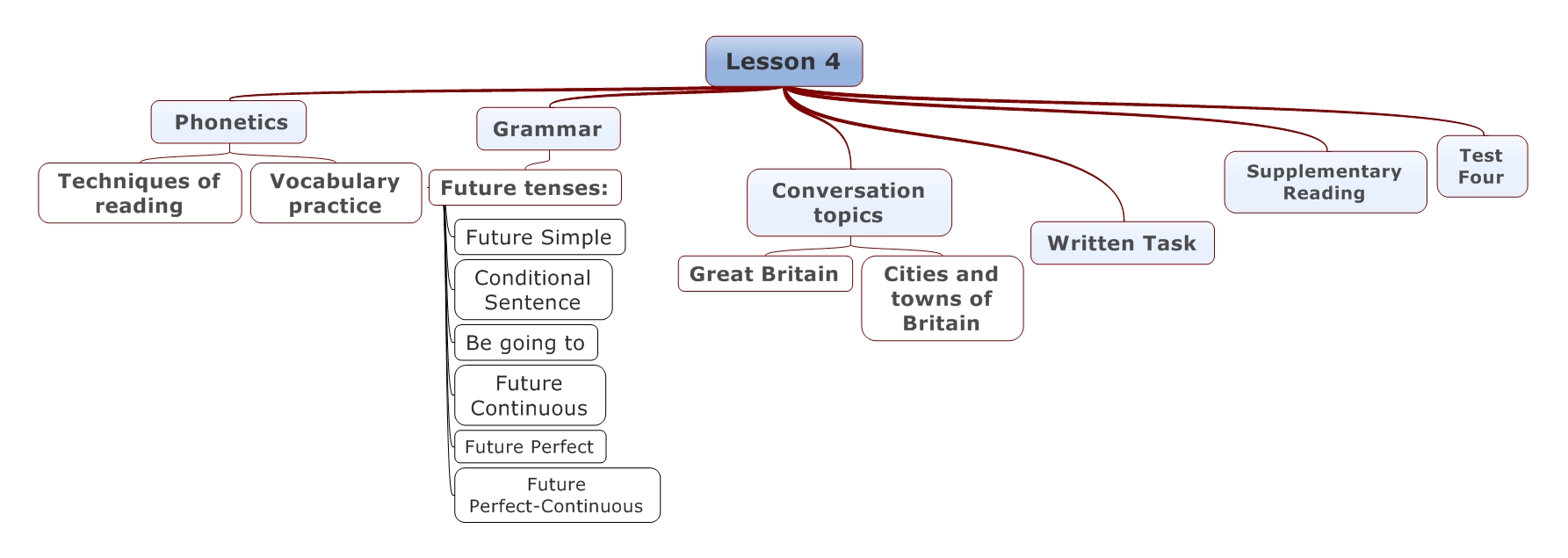Посібник з інтенсивного навчання англійської мови (для студентів внз спеціальності початкова освіта) Частина перша Київ 2013 удк ббк
 Скачать 5.32 Mb. Скачать 5.32 Mb.
|
|
Help: Feature – риса Inflection - закінчення Adjective- прикметник Flexibility –гнучкість Strength – сила Admission – допуск Compound – складова (слова) Derivative – утворене слово Ancient – стародавній Inhabitant – житель The Celts - кельти Tribe – плем’я Conquer – завойовувати Invasion – вторгнення 4.2. Conversational Topic: What helps you master the English language? 5  . Written task. . Written task.Use the vocabulary of the module “Foreign Language”, the text and your own experience to write about possible changes in your life after you master the English language. Before starting to write your essay / composition you should first make a plan. Follow the structure of any writing in the English language: Introduction: it is usually a short section, we mention the reason for writing and prepare the reader for the information that we will include in the main body. One way of adding vitality to your writing is by using quotations. They are particularly useful for the first or last sentence. Main body: your writing should be argumentative that is outline advantages and disadvantages of the question under discussion; express your personal opinion providing solutions to it - support it with arguments; express for and against arguments. You should use a different paragraph for each point you make. Begin each paragraph with a key sentence which sums up the point you are going to make. Give examples to support your point of view.We write short sentences so that the information can be understood clearly. We should link our ideas with appropriate linking words and phrases: at first, then, after that, finally, so, because, and, first of all, however, besides, what is more, also, although, such as, for example / for instance, in conclusion, so that, on condition that, on the one hand, on the other hand, as a result, at the same time, in addition to, consequently, all in all, on the whole, etc. Conclusion: summarise the points in the main body, make a recommendation for a future action and offer a personal opinion. Reread the written work and check for grammar and spelling mistakes.  Test three Grammar and Vocabulary 1. Fill in the correct tense of the verbs in brackets. A: What 1) ______ (you/do) this evening? B: I 2) _______ (play) tennis with Pete. We settled it last Monday. A: 3) ______ (you/speak) to Kate yesterday? B: No, she 4) _______ (sleep) when I called. A: Sue looked really tired yesterday, didn't she? B: Yes, she 5) _______ (study) all night for the exam. A: When 6) _______ (you/meet) Phil? B: A couple of weeks ago. We 7) ________ (walk) along the beach when I saw him. A: Did you watch the film yesterday? B: No, it 8) _______ (finish) by the time we got home. 2. Choose the correct answer. 1. ‘I ________ about buying a new car for long.’ ‘Really? What sort of car?’ A have been thinking B was thinking C thought 2. ‘I feel very tired.’ ‘How can you be tired? You ________ a thing during a day. A didn’t do B aren’t doing C haven’t done 3. ‘Whose is this earring?’ ‘I don’t know. I found it while I ________ the house. A had cleaned B was cleaning C am cleaning 4. ‘The restaurant was packed last night.’ ‘Yes. Luckily, I ________ a table in advance.’ A was booking B had booked C booked 5. ‘What were you doing this time last year?’ ‘Oh! It was splendid! My wife and I, we _______ most of the time on the beach.’ A spent B had spent C were spending 3. Identify tenses; match numbers to the letters of columns A and B. A 1) Sam has been talking on the phone for half an hour. 2) The plane from Brussels arrives at 8:30. 3) Ann had finished her work before she met her friends. 4) Stuart has just got a letter. He is happy. 5) We have had the dog for three years. 6) They are moving into a new flat next week on Friday. 7) First she paid the driver, then she got out of the taxi. 8) At seven o’clock yesterday evening they were having dinner. 9) They had been looking for a house for six months before they found the needed one. 10) He was walking down the street when he ran into an old friend. B action which a) - started in the past and continues up to the present (used with state verbs); b) - recently finished and whose result is visible in the present; c) - puts emphasis on the duration of an action which started in the past and continues up to the present; d) – has been arranged for the near future; e) – is used with programmes or timetables; f) – was in progress when another action interrupted it; g) - happened before another past action or before a stated time in the past; h) - happened immediately one after the other; i) - puts emphasis on the duration of a past action finished before another past action; j) – was in progress at a stated time in the past 4. Match the number of the sentence to the right letter of the tag question. A 1) You didn’t like strong coffee, ______ you? 2) You talked to the boss, ______ you? 3) Susan and Kevin can’t wait for you, _______they? 4) He can do this test on his own, _______he? B a) can b) did c) can’t d) didn’t MODULE 2: Crossing Barriers LESSON FOUR “A journey of a thousand miles starts with a single step.” Chinese proverb  LESSON FOUR. Part one 1. Phonetics and Language 1  .1. Techniques of reading .1. Techniques of reading Task 1: Read the English letters. K f J r L d B w a P c R s X m Q i o g F d E W y U v Z G Y j I q H s N e T y O u Task 2: Spell the following words. Don’t be afraid of difficulties. Go ahead! Dream. Explore. Discover. Enjoy. Task 3: Read the words as in the examples given in bold (underlined syllables are stressed). Here, severe, sphere, zero, serious, serial, period, stereo, hero; That, cat, happen, crack, catch, latter, happy, black, badge, drank; Help, pen, bench, edge, enter, letter, bedroom, gentle, settle, length; Doctor, strong, daughter, knock, autumn, caught, fond, rock; Must, cup, hungry, pulse, club, under, thunder, judge, Dutch; Sit, pick, quickly, did, crypt, inch, symbol, gym, synonym. Task 4: Read affirmative sentences with the falling tone. Stress the underlined words. They are very tired. I am happy. The lazy dog lay in the shade. It is a fine night for a ride. They may stay till April. You ask too many questions. No one knows him. I was afraid to spend so much money. The airplane finally arrived in Paris. I prefer tea to coffee. Task 5: Read special questions with the falling tone. Where do you live? How do you pronounce this word? What are they arguing about? Who wrote this poem? How do you do? How are you? What do you choose? What are you? Who are you? Task 6: Read general questions with the rising tone. Are you happy? Do you like jazz? Is this way to the city centre? Will you wait for me, please? Is it snowing? May I use your phone? Can I help you? Shall I read? May I come in? Do you want me to read? Have you enjoyed the time?
There are a lot of synonyms in the English language. Read some examples. Dismiss (verb): discharge, cashier, sack, fire, bounce, drop. Serious (agjective): grave, solemn, sedate, staid, sober, earnest. Small (adjective): little, diminutive, petite, wee, tiny, teeny, weeny, minute, microscopic, miniature (compare with antonyms: big, great, large, vast, huge, immense, enormous, gigantic, colossal, mammoth, elephantine, titanic, Cyclopean, Gargantuan.) Work (noun): job, toil, grind, calling, pursuit, metier, performance, exertion, occupation, labour, accomplishment, travail, drudgery, opus, production, employment, effort, business.
Revision: Translate and write three forms of irregular verbs Beat, begin, lose, meet, pay, blow, ride, burst, seek, sew, cost, shake, deal, feed, freeze, smell, split, hang, stick, hurt, lend, throw, understand, forgive, throw, wake, draw, lead, shoot, swear. 2.1. Future Tenses – FUTURE OVERVIEW Study grammar references first then a table below.  The ways to express actions in the future:
We have already studied the situations to express future actions in the present simple and present continuous. Compare the examples. The concert starts at 7 o’clock tomorrow evening. The bus leaves in ten minutes. The language course finishes in May. He is flying to Rome in an hour. I am meeting Boris tonight. I’m buying that car, I have arranged it. We are having a party with our groupmates on Friday. 2.2. Future Simple (will) and be going to express future actions. Study the sentences: a) Future simple + I (He, She, It, We, You, They) will phone you. / I’ll phone you. ? Will you phone me? – Yes, I will. No, I will not / No, I won’t. - I won’t phone you. Scheme: will +bare infinitive (where ‘will’ is used for all persons.) b) be going to + I am going to drive to Lviv. ? Are you going to do it? – Yes, I am. - I am not going to drive anywhere.
 Revision 1: Study the situations when the future simple tense and be going to are used. Read attentively the blocks of examples and explanations to them. a) - I think you will be rich (a prediction about the future, which is not exact. It is based on what we think, believe, imagine.) - I’m sure life will be better in fifty years. - Perhaps I will do it. / I’m afraid I won’t do it. b) - Look at the tree. It is going to fall down (a prediction which is evident. It is based on what we can see or what we know.) - Look at the clouds. It is going to rain. - He is going to rescue the boy. - She is going to jump out of the plane. - He is going to throw the ball. c) - He will be thirty in February (it will happen in the future in any case, without our control.) - The temperature will reach 40 degrees C tomorrow. - She’ll be twenty next month. d) – I promise I will do it (in promises.) - I’ll bring this book to you. - Don’t worry. I’ll get a good job. e) - I’ll take this piece of meat (on the spot decision - made at the time of speaking.) - ‘There is no butter for cookies.’ – ‘I will go to the shop and buy it.’ f) - Stop or I’ll shoot (in threats or warnings.) - Give it back to me or I’ll cry. - Can’t you understand it? I’ll show how to do it (in offers.) - I hope you will help me (in hopes.) g) - I’m going to become a famous singer one day (for plans, intentions and ambitions we have about the near future.) - She is going to fly to Paris (she has already decided to do it but she has not arranged the time and she hasn’t bought tickets.) Compare: Peter is going to drive to London tomorrow morning (he has decided to do it.) Peter is driving to London tomorrow morning (he has arranged everything before.) OR: They are going to get married in August (a planned action for the near future.) They are getting married in August (an arranged action for the near future.) - I’m going to have a party next week (plan / intention.) I’ll invite all my friends. I will think of great programme (some details are added.) – Oh, It’ll be great! (Some comments are given.) Read and translate some conditional sentences: I will call you before I leave for Prague. She will go to school when she is five years old. I’ll go to the theatre if I get a ticket.
|

 rammar
rammar